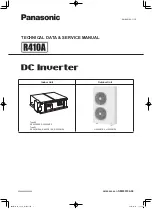
2.2 Explanation of Symbols
This section gives an explanation of all the symbols shown on the inverter and
on the type label.
Symbols on the Inverter
Symbol
Explanation
Operating Display.
Battery status.
An error has occurred, please inform your installer immediately.
Symbols on the Type Label
Symbol
Explanation
CE mark.
The inverter complies with the requirements of the applicable
CE guildlines.
TUV certified.
RCM remark.
SAA certification.
Beware of hot surface.
The inverter can become hot during operation. Avoid contact
during operation.
Danger of high voltages.
Danger to life due to high voltages in the inverter!
Danger.
Risk of electric shock!
Observe enclosed documentation.
08
The inverter can not be disposed together with the household waste.
Disposal information can be found in the enclosed documentation.
Do not operate this inverter until it is isolated from battery and mains.
Danger to life due to high voltage.
There is residual voltage existing in the inverter after powering off,
which needs 5 min to discharge.
• Wait 5 min before you open the upper lid.
This chapter follows the requirements of the European low voltage
directives, which contains the safety instructions and conditions of
acceptability for the consumer's system, which anyone must follow when
installing, operating and servicing the unit. If ignored, physical injury or
death may follow, or damage may occur to the unit. Read this instruction
before you work on the unit. If you are unable to understand the dangers,
warnings, cautions or instructions, please contact an authorized service
dealer before installing, operating and servicing the unit. The grid
connected inverter meets the requirement stipulated in Low Voltage
Directive (LVD) 2014/35/EU and Electromagnetic Compatibility (EMC)
Directive 2014/30/EU. The unit is based on: EN 62109-1:2010; EN 62109-
2:2011; IEC 62109-1(ed.1); IEC62109-2(ed.1); EN 61000-6-3:2007+A:2011; EN
61000-6-1:2007; EN 61000-6 -2:2005.The grid connected inverter from the
factory will be ready for connecting to devices and the mains, and the unit
shall be installed in accordance with national wiring regulations.
Compliance with safety regulations depends upon installing and
configuring system correctly, including the use of the specified wires and so
on. The system must be installed only by professional installers who are
familiar with requirements for safety and EMC. The installer is responsible for
ensuring that the whole system complies with all the relevant laws in the
country where the unit is installed.The individual subassembly of the
system shall be interconnected by means of the wiring methods outlined in
national/international regulations such as the national electric code (NFPA)
No.70 or VDE regulation 0107.
2.3 CE Directives
09
Safety
Safety







































